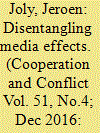|
|
|
Sort Order |
|
|
|
Items / Page
|
|
|
|
|
|
|
| Srl | Item |
| 1 |
ID:
149492


|
|
|
|
|
| Summary/Abstract |
Whether and how media are able to influence policy and the political decision-making process is still the topic of much debate. However, if news media are indeed able to influence policy, they are commonly believed to do so indirectly through their agenda-setting function – by getting issues onto the political agenda after sudden peaks of attention. Yet, despite the assertion of agenda-setting theory that policy changes occur mainly through steady advocacy of policy alternatives, little attention has been paid to the long-term effects of media exposure. The analysis of emergency assistance in Belgium from 2000–2008 shows that short-term and long-term media attention to specific countries affect decision-making in quite different ways. This study reveals different ways in which media attention can impact policymaking, as short-term attention mainly determines which countries receive assistance, while long-term attention affects the amount of assistance granted.
|
|
|
|
|
|
|
|
|
|
|
|
|
|
|
|
| 2 |
ID:
093603


|
|
|
|
|
| Publication |
2010.
|
| Summary/Abstract |
The role of the media in foreign policymaking has been the subject of significant academic enquiry, particularly in response to the so-called 'CNN effect', but this work has mostly focused on prominent Western nations (particularly the United States). This article enlarges the debate by adding a comparative and post-communist perspective. Taking the Kosovo conflict as a case study, it analyses the role of the media in foreign policy in Bulgaria and Britain. Through the application of Robinson's policy- media interaction model, the article argues that the Bulgarian press did not have any substantial impact on the government's position on the Kosovo conflict because it framed its reports in a neutral way. The British press/foreign policy relationship discloses a clear case of media support for governmental policy. The findings raise questions about the validity of certain claims about the media-policy relationship in former socialist countries. The article identifies limitations to models based on Western media systems and suggests that their construction is often based on certain cultural assumptions and hence very much context bound
|
|
|
|
|
|
|
|
|
|
|
|
|
|
|
|
| 3 |
ID:
164449


|
|
|
|
|
| Summary/Abstract |
Recent studies of media and security continue to be limited by various theoretical and ontological commitments, despite their claims of “moving beyond” or “reconsidering” the CNN effect. In this article, I review the two dominant research paradigms for media and security. The first research paradigm, which includes the CNN-effect literature, imagines media as an independent actor in the policy-making process. The second research paradigm portrays media as a neutral channel, passing along the message of foreign policy elites. Each of these paradigms remains wedded to an actor-centered and choice-theoretic approach to media and security, as witnessed by recent attempts to study the CNN effect. I argue that a new research paradigm based on relational sociology actually moves media and security studies beyond the CNN effect and resolves the fundamental theoretical limitations associated with it.
|
|
|
|
|
|
|
|
|
|
|
|
|
|
|
|
| 4 |
ID:
148127


|
|
|
|
|
| Summary/Abstract |
After the ‘CNN effect’ concept was coined two decades ago, it quickly became a popular shorthand to understand media-conflict interactions. Although the connection has probably always been more complex than what was captured in the concept, research needs to be updated in order to better understand the multifaceted contemporary environments of both media and conflict. There are growing numbers and types of media sources, and multiple interactions between media and conflict actors, policymakers and engaged publics from the local to the global and back. We argue that understanding the impact of media reporting on conflict requires a new framework that captures the multilevel and hybrid media environments of contemporary conflicts. This study provides a roadmap of how to systematically unpack this environment. It describes and explains how different levels, interactions, and forms of news reporting shape conflicts and peacebuilding in local, national and regional contexts, and how international responses interact with multiple media narratives. With these tools, comprehensive understandings of contemporary local to global media interactions can be incorporated into new research on media and conflict.
|
|
|
|
|
|
|
|
|
|
|
|
|
|
|
|
| 5 |
ID:
158458


|
|
|
|
|
| Summary/Abstract |
Syria's devastating war unfolds during unprecedented flows of imagery on social media, testing in new ways the media's influence on decision-makers. Three decades ago, the concept of a “CNN Effect” was coined to explain what was seen as the power of real-time television reporting to drive responses to humanitarian crises. This essay explores the role traditional and new media played in U.S. policy-making during Syria's crisis, including two major poison gas attacks. President Obama stepped back from the targeted air strikes later launched by President Trump after grisly images emerged on social media. But Trump's limited action did not shift policy. Interviews with Obama's senior advisors underline that the media do not drive strategy, but they play a significant role. During the Syrian crisis, the media formed part of what officials describe as constant pressure from many actors to respond, which they say led to policy failures. Syria's conflict is a cautionary tale.
|
|
|
|
|
|
|
|
|
|
|
|
|
|
|
|
|
|
|
|
|